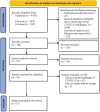A Review of COVID-19 Response Challenges in Ethiopia
- PMID: 36078785
- PMCID: PMC9518440
- DOI: 10.3390/ijerph191711070
A Review of COVID-19 Response Challenges in Ethiopia
Abstract
Background: The COVID-19 pandemic has positioned fragile healthcare systems in low-income countries under pressure, leading to critical gaps in service delivery. The pandemic response demands the healthcare system to be resilient and continue provision of healthcare services. This review is aimed at describing the healthcare response challenges during the pandemic in Ethiopia.
Methodology: Eligible studies dealing with challenges of the healthcare system in response to the COVID-19 pandemic in Ethiopia were included. The six World Health Organization (WHO) healthcare system building blocks were used to categorize healthcare challenges. PubMed ProQuest, databases were searched, and results were summarized using systematic review synthesis.
Results: Financial constraints led to a shortage of mechanical ventilators. Furthermore, the pandemic hindered the capacity to avail full packages of personal protective equipment in health facilities and intensive care capacity. The pandemic also affected the delivery of maternal, child and new-born services, prevention, and treatment of childhood illness, including immunization services.
Conclusions: The COVID-19 pandemic posed various challenges to the performance of the healthcare system in Ethiopia. It is recommended that policy makers and stakeholders enhance pandemic preparedness and strengthen response capacity by considering the six WHO healthcare system building blocks.
Keywords: COVID-19; healthcare system; pandemic response; resilience.
Conflict of interest statement
The authors have declared that no competing interests exist.
Figures
References
-
- World Health Organization (WHO) Everybody’s Business: Strengthening Health Systems to Improve Health Outcomes—WHO’s Framework for Action. WHO; Geneva, Switzerland: 2007.
-
- Heymann D.L., Chen L., Takemi K., Fidler D.P., Tappero J.W., Thomas M.J., Kenyon T.A., Frieden T.R., Yach D., Nishtar S., et al. Global health security: The wider lessons from the west African Ebola virus disease epidemic. Lancet. 2015;385:1884–1901. doi: 10.1016/S0140-6736(15)60858-3. - DOI - PMC - PubMed
-
- Ahmed T., Rahman A.E., Amole T.G., Galadanci H., Matjila M., Soma-Pillay P., Gillespie B.M., El Arifeen S., Anumba D.O.C. The effect of COVID-19 on maternal newborn and child health (MNCH) services in Bangladesh, Nigeria and South Africa: Call for a contextualised pandemic response in LMICs. Int. J. Equity Health. 2021;20:77. doi: 10.1186/s12939-021-01414-5. - DOI - PMC - PubMed
Publication types
MeSH terms
LinkOut - more resources
Full Text Sources
Medical



